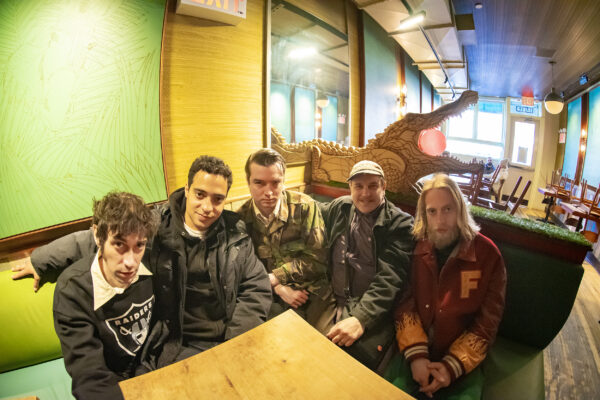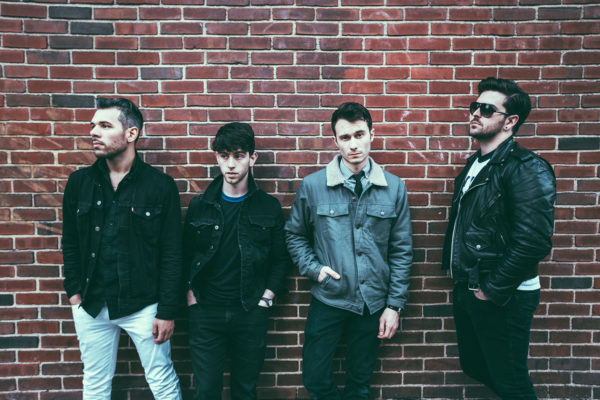[soundcloud url=”https://api.soundcloud.com/tracks/186831310″ params=”color=ff5500&auto_play=false&hide_related=false&show_comments=true&show_user=true&show_reposts=false” width=”100%” height=”166″ iframe=”true” /]
Rocket & The Ghost has always been a very original sounding rock band. The release of their new single, “Better Than Before” now shows they’re a constantly evolving one as well. I sat down with bassist/singer Kiyoshi Matsuyama on the comfy couches at LES staple – Welcome to the Johnsons and talked about the band’s new single, how the band works on new material, the taboo of working with outside writers, and what we think about the current state of pop music. When we last left our heroes they were stumbling their way around Red Hook after an afternoon of sampling different whiskeys and moonshine, so we decided to stick with PBR this time.
P&W: I can definitely hear “Better Than Before” stand out from songs off the EP. Was the song written separately than those?
Kiyoshi: Yeah. Well at least separately with intention. It’s definitely different from what we’ve done before. I think all of our new stuff is different that what we’ve done in the past. We’re still a baby band, and I hate that term (laughs). Mainly I hate that term when other people say that, but we are in some regards. We’re still figuring out what it is we can do. We’re not in the infancy stage, but we’re almost hitting puberty.
P&W: Like those awkward middle-teenage years?
Kiyoshi: I would say some of the awkward teen years are behind us, at least I fucking hope so. We’re not quite as sophisticated as a college freshman but just about to graduate from high school.
P&W: Was the song written by yourself?
Kiyoshi: Yeah mostly by myself. The way I like to work, is with everyone in the band and have everyone come up with different parts. This particular song was one where not every single part was done. Most of them were, but coming in it was those guitar and synth stabs, an being a very spacious song, that wasn’t in there initially.
P&W: From the moment you introduced the initial concept to your bandmates, how long did it take from then to the point where you felt it was ready to be heard?
Kiyoshi: In some ways I still feel like it’s not done. That’s how I feel about most of my songs though. At a certain point it, if it feels good enough to dance to live, then it’s good enough to record. There’s nothing really set in stone either, it just came together very quickly, this song. From the time I introduced it to the band to when we flushed out little things, there wasn’t a lot of time in between; maybe because it wasn’t like anything we’ve worked on before. I guess at that point we’d been listening to bands like The Cars and all this new wave shit, and you can hear it in the bridge of the song too, with those duo synth parts. That’s The Cars right there man.
P&W: When you started writing this one, was your goal to sound different than previous material?
Kiyoshi: Yeah definitely.
P&W: And when you start working on new material after an EP release, do you try to go for a recognizable a progression or just a totally different sound entirely?
Kiyoshi: I guess for me I’m at the point where I don’t want to force something to sound much different, but I will go for a flavor that we have not introduces yet. Although I don’t want to play it out live or record it unless it gives me shivers where it feels right to be playing it. I would never want to force a song out for the purpose of sounding different than what was on the last project. I am always open to trying new things with a purpose.
I’m quickly distracted and mesmerized by the opening acoustic guitar riff to Mariah Carey’s “Always Be My Baby”, only to be turned off by the bartender :25 seconds in
P&W: HEY WHAT THE FUCK?!?
Kiyoshi: Yeah I do not like this bartender tonight.
Bartender instead turns on “Young Turks” by Rod Stewart, and order is restored to the realm
P&W: So you would agree this single is a solid progression from the EP?
Kiyoshi: I’m not totally satisfied with everything on the EP. I always feel songs can be better. You look back on the stuff that you did and think “Oh I’m such an idiot.”
P&W: Is that because you’ve played and heard those songs so many times?
Kiyoshi: I think it comes from the same place as how you used to think some things were so important as a teenager, and you laugh at how silly you were. It definitely comes from the same place as that. You’re always better than you were then. I’m not taking anything back and I loved making it, but at times I’ll look back on it and wish I’d done things better.
P&W: Does it give you a new look at a band like The Rolling Stones having to play songs they wrote forty years ago?
Kiyoshi: You should keep this recording and we’ll talk again in forty years to find out.
P&W: Oh Kiyoshi don’t be ridiculous… we’re not going to make it to 60.
Kiyoshi: Not if we keep drinking PBRs like this
P&W: Do you think with your new material, it just comes down to where you’re at as a songwriter, and as a writer you write what you know. You’re a year or so older, you’re band has progressed, you’ve gotten married, you’ve got a bit more traction in the local music scene. Those changes have to become evident in how your songs sound from the ones written a year ago
Kiyoshi: You know if none of that existed, I would still be a different person than I was a year ago. That would really suck if I were the same person I was a year ago. I think songwriting is also a craft. Not in a pretentious way, but the way you go about it can be a discipline. There are things I liked a year ago that I don’t like now. I need that sensation of being in a room with the band, and we’re cutting deep into something, or that moment live where you’re all locked in. Which is why I rely on everyone in the band to make our music work.
Toto’s “Africa” begins to play on the speakers
P&W: You guys need to cover this song
Kiyoshi: You know I’m always thinking about different covers we could do. Covers are a weird thing man.
P&W: Do you think there are covers that are better than the original?
Kiyoshi: I do
P&W: I think you guys could out play Toto if you cover this song
Kiyoshi: Out play Toto?? I’m cutting you off.
P&W: Did you play the song a handful of times to see what a live reaction would be while you were still working on it?
Kiyoshi: I can’t tell you how many songs we’ve written and thought were great, then bombed at shows. People wont boo, but it’s a very neutral experience, which is even worse. I refuse to play a song regularly, that results in kept-in applause.
P&W: So how many times did you play it live before you felt it was ready to record?
Kiyoshi: I’d guess we played ten shows with it.
P&W: And it that time did it grow?
Kiyoshi: You know out of all our songs, they’re a constant flow of critique and growth, but with this one we knew early on that it was strong.
P&W: With pop music doesn’t it seem like you’re having to worry about consumer/fan reaction? The goal is to sell units. Do you see artists like Lana Del Rey or St. Vincent or Lorde really going after their own sound and not worrying about anyone’s expectations but their own?
Kiyoshi: When you’re as big a Lana Del Rey you’ve got a team of producers in there working with you. It’s very rare that you’re going to be writing solely by yourself if you’re under a major label. And by very rare I mean it just simply doesn’t happen.
P&W: In the 80s when veteran acts started working with outside songwriters and the A&R position really began to take hold of the recording industry, a lot of veteran artists were skeptic at first. They would think someone working on songs with them would change the chemistry and musical components of the band.
Kiyoshi: I don’t think having someone cone in and help write a song is a bad thing at all. Collaboration is the best way to work. I think there are a lot of artists out there who feel weird about collaborating with other writers.
P&W: Well a lot of artists are weird
Kiyoshi: And a lot of them are terrible
P&W: So there’s always going to be different preferences when it comes to songwriting then right?
Kiyoshi: I mean it’s the only way you get better. Collaboration is really big. That’s why I’m happy about what we do because there’s a lot of collaboration when we write, especially on a lot of our new songs.
P&W: You wrote some songs off you’re first EP with Lily from PARLOUR TRICKS right?
Kiyoshi: I did yeah.
P&W: And do you feel they would’ve come out the way they did if there hadn’t been that collaborative mix?
Kiyoshi: I don’t think they would’ve been entirely similar at all. That’s what I mean though, at that time- that’s the way those songs needed to happen.
P&W: You’ll find artists all the time who are amazing at writing riffs or coming up with perfect chord progressions, but can’t put a lyrical hook or melody over it to save their lives. Is that where that musical teamwork is so important?
Kiyoshi: I don’t think there’s any possible way to write an entire song by yourself, or at least find influence from other people. I think it can be done, but it’s so rare to get a moment where you can sprout an entire song out of you’re brain. You always go for that magical song that you can never get just sitting there by yourself. It’ll come to you after you’ve been toiling and tinkering at it for a while.
P&W: There’s really not a lot of differences between a good producer or an outside songwriter is there?
Kiyoshi: Nope. You know I’ve known a lot of bands over the past few years that are sticklers about producing their own music. They’re sticklers about keeping their writing, performing, recording, and production all to themselves… and they’re usually not great. I wish people would get outside the box more often and especially work with others that they haven’t worked with before. It’s really hard to be objective when you’re the artist.
P&W: That’s what great about art though, even if a project sounds like total shit, there’s SOMEONE out there who will get into it.
Kiyoshi: Yeah and as long as they’re proud of what they’ve put together, that’s really all that matters. That’s a lot different than thinking commercially, like is this going to sell for .99 cents on iTunes. I try really hard not to think that way, but I obviously do.
P&W: If you’re writing music for the purpose of having it be heard by others aren’t you always going to have those second-guessing thoughts in the back of your head?
Kiyoshi: Why would you do it if you didn’t care what other people thought though? Ultimately if you want to play music, while keeping your art intact, then you should’ve stayed in your bedroom like you did in high school just playing the guitar for your own enjoyment. If you actually want people to hear you’re music, you have to consider writing stuff that people want to listen to. It’s easy to not give a fuck, but those bands that don’t are ones you’ll never hear about.
P&W: There’s always the exception. Like GWAR.
Kiyoshi: Did they not give a fuck though? Or is that their shtick?
P&W: I guess they are a new generation of KISS. There are those bands that really don’t give a fuck though.
Kiyoshi: But those bands that claim they don’t give a fuck, by like cutting the dick off a blown up Justin Beiber manican, those theatrics take time, money, and planning. Those guys really do give a fuck. I think a lot of people really buy into the whole legend thing, that all these great songwriters wrote all these amazing things in one organic process. Sometimes it’s just not. Most times you’ve had to force yourself to or it’s that time on your recording contract that you have to get back into the studio and put out some new material. You’re not always ready for that. Lou Reed did Loaded out of spite. He had to listen to the label say “There’s no hits” and he responded with “Okay fuck you, fine here’s an album with all the hits you want.” I think people still want to believe that music is this organic thing, but in a lot of cases it’s carefully made and marketing to look like an organic thing. It’s tough in music to tell what’s an act and what is real.
P&W: Do you have a problem with pop music in general?
Kiyoshi: I don’t. I don’t think music has lost anything by no longer being in the good ‘ol days, it’s always been this way. The best sale you get from music is from the organic PR story. Who knows where GWAR’s or Nirvana’s angle was, but if a band what’s to specifically make FM friendly songs, I dig that, especially if they’re still good songs. How else are you going to get the most people to hear your music as humanly possible?
P&W: There’s a stigma to pop music these days, and it’s too bad because pop music doesn’t have to suck.
Kiyoshi: I don’t think pop music was pop music is as bad as most people make it seem. I think pop music is REALLY exciting these days because of how talented the producers are and how strong production quality has gotten. The quality of the live show in a lot of ways just sounds better than it used to sound. Some people are just brilliant when it comes to writing pop songs. It’s amazing. Like I said, do you want to play music to make people dance? If you want to be the artist that doesn’t want to have people tell you what to do, there’s always a place for that. If you want to play 20’s jazz there’s always going to be a spot for that somewhere with someone wanting to hear it. There are so many ways to get what you want out of playing music, that there’s no reason to not do it, just because it may or may not be hot. Pop artists and producers aren’t bad guys, they’re there because they want to be there, and good for them for going after what they want.
We look around seeing if it’s time for a new beer, only to notice we have 2 or 3 that haven’t even been touched yet just sitting in our collection. Strange how that always happens when beers only cost $2.
Kiyoshi: At the end of the day music will give you whatever you want out of it. I almost wish when I was learning guitar and bass as a kid that my teacher would’ve said “If you want to play music that’s good, but if you want to make it as a career it’s going to be crazy.”



